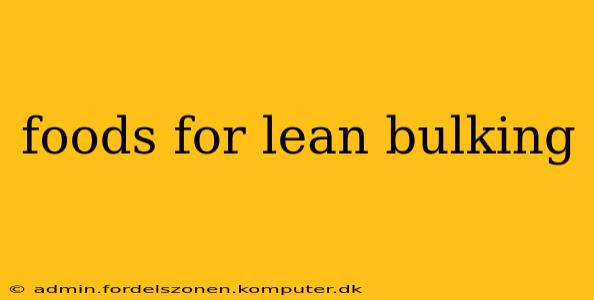Lean bulking is the holy grail for many fitness enthusiasts: building muscle mass while minimizing fat gain. It's a delicate balance requiring a strategic approach to nutrition. This guide dives deep into the best foods to support your lean bulking journey, addressing common questions and misconceptions along the way.
What are the best foods for lean bulking?
The cornerstone of a successful lean bulking diet lies in consuming enough calories to support muscle growth while maintaining a slight caloric surplus. This means eating more calories than you burn, but not so many that you store excess fat. The key is prioritizing nutrient-dense foods that provide ample protein, healthy fats, and complex carbohydrates. Here's a breakdown of excellent food choices:
High-Protein Sources: Protein is crucial for muscle repair and growth. Aim for 1.6-2.2 grams of protein per kilogram of body weight (0.73-1 gram per pound). Excellent sources include:
- Lean Meats: Chicken breast, turkey breast, lean beef, and fish (salmon, tuna, cod).
- Eggs: A complete protein source, packed with essential nutrients.
- Dairy: Greek yogurt (high in protein), cottage cheese (slow-digesting protein), and skim milk.
- Legumes: Lentils, chickpeas, and black beans are excellent sources of plant-based protein and fiber.
- Protein Powders: Whey, casein, soy, or brown rice protein powder can supplement your protein intake conveniently.
Complex Carbohydrates: These provide sustained energy for your workouts and daily activities. Choose:
- Brown Rice: A whole grain offering fiber and essential nutrients.
- Quinoa: A complete protein source and a good source of fiber.
- Oats: High in fiber and provides sustained energy release.
- Sweet Potatoes: Rich in vitamins and minerals, providing energy without a significant sugar spike.
- Whole-wheat Bread and Pasta: Opt for whole grains over refined options for better fiber content.
Healthy Fats: Essential for hormone production and overall health. Include:
- Avocados: Rich in monounsaturated fats and fiber.
- Nuts and Seeds: Almonds, walnuts, chia seeds, and flax seeds provide healthy fats and protein.
- Olive Oil: Use for cooking and salad dressings.
- Fatty Fish: Salmon, mackerel, and tuna are excellent sources of omega-3 fatty acids.
What are some common mistakes to avoid during lean bulking?
Many fall into traps that hinder their progress. Avoid these common pitfalls:
- Overeating: While a slight caloric surplus is necessary, overdoing it leads to excessive fat gain. Track your calories and adjust your intake based on your progress.
- Neglecting Macros: Focusing solely on calories and ignoring your protein, carbohydrate, and fat intake can compromise muscle growth and overall health.
- Ignoring Training: Nutrition is only half the equation. A consistent and challenging workout routine is essential for muscle growth.
- Lack of Sleep: Adequate sleep is crucial for muscle recovery and hormone regulation. Aim for 7-9 hours of quality sleep per night.
- Not Tracking Progress: Regularly monitor your weight, body composition, and strength gains to assess your progress and make necessary adjustments.
How many calories should I eat for lean bulking?
Determining your ideal caloric intake requires careful calculation. Start by calculating your Basal Metabolic Rate (BMR) – the number of calories your body burns at rest. Then, factor in your activity level to estimate your Total Daily Energy Expenditure (TDEE). Add a modest surplus of 250-500 calories to your TDEE to promote lean bulking. This is a starting point; you may need to adjust based on your progress.
What supplements can help with lean bulking?
While a balanced diet is paramount, some supplements can support your efforts:
- Creatine: Enhances strength and power output.
- Protein Powder: A convenient way to boost your protein intake.
- BCAAs (Branched-Chain Amino Acids): May reduce muscle soreness and improve recovery.
Disclaimer: Consult a healthcare professional or registered dietitian before starting any supplement regimen.
What are some sample meal plans for lean bulking?
Creating a personalized meal plan is crucial, considering your individual caloric needs and preferences. However, here are some sample meal ideas:
Breakfast: Oatmeal with berries and nuts, Greek yogurt with fruit and granola, eggs with whole-wheat toast and avocado.
Lunch: Chicken salad sandwich on whole-wheat bread, leftovers from dinner, quinoa salad with grilled chicken or fish.
Dinner: Baked salmon with roasted vegetables, lean ground beef stir-fry with brown rice, chicken breast with sweet potato and broccoli.
Snacks: Protein shake, Greek yogurt, nuts and seeds, fruit.
Remember to adjust portion sizes to meet your individual caloric needs.
Can I gain muscle without gaining fat?
Yes, lean bulking aims to maximize muscle growth while minimizing fat gain. It's achievable with careful attention to nutrition, training, and recovery. But it's important to manage expectations—some fat gain is almost inevitable, but it should be minimal with the right strategy.
This guide provides a comprehensive overview of lean bulking nutrition. Remember that consistency and patience are key to achieving your fitness goals. Consulting with a registered dietitian or certified personal trainer can provide personalized guidance tailored to your specific needs and goals.
